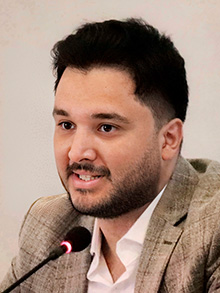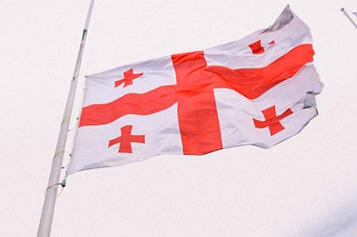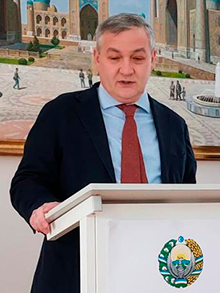Publications
Azerbaijan’s Efforts to Digitalize the Middle Corridor  By Vusal GULIYEV, Visiting Research Fellow at the Asian Studies Center of Boğaziçi University
By Vusal GULIYEV, Visiting Research Fellow at the Asian Studies Center of Boğaziçi University
Located at a key geopolitical and geo-economic point in the Silk Road region, Azerbaijan has been a main initiator in the development of technologically advanced and economically viable trans-border logistics and transit services. This is largely due to Baku’s embrace of a wide spectrum of digitalization and innovation initiatives within the broad-based connectivity framework of the Middle Corridor Initiative (MCI) and other similar such projects. This IDD analytical policy brief will examine various aspects of this important topic as it relates to MCI.
Seizing new opportunities in the digital era whilst developing better measures to boost the digital economy and trade with embedded innovation and emerging technologies has become one of Azerbaijan’s top priorities in the past few years. In the wake of significant government-backed digital transformation efforts, special attention is now being placed on enhancing the variety of logistics services on offer, building cutting-edge infrastructure, and upgrading domestic communication systems.
READ MORE
Publications
The Georgian Perspective on Geopolitical Changes in the Caucasus  By Eugene KOGAN, Tbilisi-based defence and security expert
By Eugene KOGAN, Tbilisi-based defence and security expert
Georgia borders Armenia, Azerbaijan, Russia, and Turkey. It remains a transit hub for oil and gas pipelines originating in Azerbaijan and a road hub for goods coming from Iran via Armenia to the European Union (EU), from Armenia and travelling to Russia, and from Turkey and travelling to Russia and Azerbaijan. As a result, changes that are taking place in the Caucasus due to the Russian war against Ukraine are directly affecting Georgia. Russia as a gatekeeper in the South Caucasus is less able to defend its interests in the region and that results in the ongoing skirmishes between Armenia and Azerbaijan, Iranian military exercises on the border with Azerbaijan, and reciprocal Azerbaijani-Turkish exercises. Thus far, Georgia has kept itself out of the conflict and has even tried to play the role of mediator in the conflict between Armenia and Azerbaijan, but to no avail, since Georgia is not considered a powerful enough conflict mediator. READ MORE
Publications
The Draft Law on Foreign Agents Contradicted Georgia’s European Aspirations  By Nika CHITADZE, PhD, Director of the Center for International Studies, Tbilisi
By Nika CHITADZE, PhD, Director of the Center for International Studies, Tbilisi
At the beginning of March 2023, the Parliament of Georgia discussed and supported by the first hearing (with 76 votes) two draft laws regarding the “agents of foreign influence”. The discussion took place against the background of fierce protests both inside and outside the Parliament building. The bills were submitted by the political party “People’s Power”, which is a satellite of the Georgian Dream ruling party. Initially, the draft law “On transparency of foreign influence” was registered in the Parliament. To “ensure transparency”, the new law required the registration of non-entrepreneurial (non-commercial) legal entities and media means which received more than 20% of their income from abroad as “agents of foreign influence”.
READ MORE
Publications
The Political Future of the Armenian Community in a Fractured Lebanon  By Yeghia TASHJIAN, Beirut-based regional analyst and researcher, columnist, "The Armenian Weekly”
By Yeghia TASHJIAN, Beirut-based regional analyst and researcher, columnist, "The Armenian Weekly”
Armenians in Lebanon are a deeply institutionalized and politicized community. Given its transnational nature, the community is affected by international, regional, and local developments. For this reason, the political parties and the community leadership analyse local events and position themselves in the Lebanese political space based on local, regional, and sometimes pan-Armenian calculations or interests. Hence the community, like other transnational ethno-religious groups, absorbs from its surroundings and reacts accordingly to preserve itself from security threats. […] This policy brief will also raise a few recommendations regarding new strategies and the need to adopt a vision for the future of the community amid the wave of uncertainties surrounding Lebanon.
READ MORE
Publications
Uzbekistan’s April 30 Constitutional Referendum Is Set To Deliver Results  By Ambassador Dilyor KHAKIMOV, Ambassador of the Republic of Uzbekistan in Belgium
By Ambassador Dilyor KHAKIMOV, Ambassador of the Republic of Uzbekistan in Belgium
Over the past year, under the leadership of President Shavkat Mirziyoyev, Uzbekistan has embarked upon a national dialogue. Input, feedback, and affirmations from tens of thousands of Uzbek citizens have guided the drafting of a revised Constitution. In recent days, a flurry of activity has occurred that may soon make this draft official and usher in a fresh era for our country as we build a “New Uzbekistan.” Last week, the draft Constitution was considered in the Legislative Chamber and was approved for submission to a referendum on April 30. Then, on Monday, March 13, the Constitutional Court of Uzbekistan ruled that the decision by the Legislative Chamber to hold a referendum was in constitutional compliance. Finally, the Senate, just yesterday, March 14, confirmed this decision and approved the draft for submission to a constitutional referendum that will take place on April 30. READ MORE.
Publications
From Syria to Nagorno-Karabakh: Assessing Russo-Turkish ‘Co-opetition’  By Yeghia TASHJIAN, Beirut-based regional analyst and researcher, columnist, "The Armenian Weekly”
By Yeghia TASHJIAN, Beirut-based regional analyst and researcher, columnist, "The Armenian Weekly”
On a diplomatic level, Turkey tried to launch “Astana style” diplomatic measures to address Nagorno-Karabakh. However, given the fact that the conflict was taking place in the post-Soviet space, Russia failed to see much incentive in engaging in a bilateral track with Turkey in the form of a new “Astana style” process where Turkey and Russia were going to be equal partners, addressing a conflict in Russia’s “backyard”.
The year 2022 witnessed intensified dialogues between top Syrian and Turkish officials. These kicked off with an August meeting in Damascus between Ali Mamlouk, the Head of the National Security Bureau of the Ba’ath Party and a Special Security Advisor to Syrian President Bashar al-Assad, and Hakan Fidan, the Head of Turkiye’s National Intelligence Organization (MIT). They concluded with a tripartite December meeting in Moscow, where Russian Defence Minister Sergei Shoigu hosted his Syrian and Turkish colleagues Ali Mahmoud Abbas and Hulusi Akar (remarkably, Ali Mamlouk and Hakan Fidan were also present). Those meetings prompted world media and political experts to speculate about an “unthinkable” Syrian-Turkish rapprochement becoming “thinkable”.
READ MORE
Publications
Will the Earthquake Threaten Erdogan’s Rule?  By Yeghia TASHJIAN, Beirut-based regional analyst and researcher, columnist, "The Armenian Weekly”
By Yeghia TASHJIAN, Beirut-based regional analyst and researcher, columnist, "The Armenian Weekly”
On February 6, 2023, two earthquakes with magnitudes 7.8 and 7.5—the deadliest in Turkey’s history—hit the Syrian-Turkish border. At least 45,000 people died in Turkey. Another 6,000 lives were lost in Syria. The fallout of the catastrophic earthquake came as President Erdogan faces his toughest re-election campaign yet. Despite speculation that Erdogan may postpone the elections, he declared that presidential and parliamentary elections will be held on the agreed-upon date, May 14 of this year.
Turkey is a central power in the Middle East. After the 2020 war in Nagorno-Karabakh, its influence increased in the South Caucasus. Thus, any political shift will have an impact on the political landscape of the region. The Turkish President is known for exploiting crises; how he will be able to manage this current crisis and use it to his advantage is still questionable. This article will analyse the impact of the earthquake on Turkey’s domestic politics amid the upcoming presidential and parliamentary elections as Turkey prepares to celebrate the centennial of its foundation as a republic in October 2023.
READ MORE